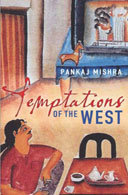India much after Gandhi: Reading Guha and Mishra
Reading Ramachandra Guha's India after Gandhi and Pankaj Mishra's Temptations of the West. This was rather by accident, but they make good reading side-by-side.
While Guha seems, at least so far, to be quite optimistic of the strength of Indian democracy, reading Pankaj Mishra's Temptations of the West one is left with no illusions about Indian reality of democracy. Mishra is a journalist with a keen eye and a sensibility worthy of a poet. In contrast to the Doon-school,
IIM-educated Bangalorean Guha, Mishra was born in Jhansi, grew up in small-town North India, went to school in Allahabad and spent his youth in Benares. He comes from a different milieu than Guha and correspondingly his views are darker, and I would like to think closer-to-the-ground than the firmly-grounded academic historian. The rest of the book moves on further into the rest of South Asia (more on that later), but the Indian themes, or axes as Guha calls, are pretty much the same - caste-based politics, regionalism, proto-fascist Hindutva, being Muslim in India and others.
I haven't finished reading either book and it would be premature to make a final judgement. One thing is clear that issues raging in the country today were pretty much the same in 1950. While some progress has been made, but much of the tribal population and rest of India lives in a feudal time. This sort of reality is hard to imagine from the eyes of an urban Punekar, now deracinated expat. One hopes that books help us bridge that distance.
I write this at a time when Anna Hazare's strike has just been called off after the government has acceded to his some of Team Anna's demands. The whole affair right or wrong, undoubtably signals the failure of constitutional democracy. Indeed, as Guha's book informs us that Ambedkar, the architect of the constitution, warned that Indians in Free India needed to abjure from Gandhian methods of fasts, hartals, picketing, and the like and use constitutional methods to achieve their ends. Of course, such methods have been mostly ineffective in the last 60 years. It may seem like a Quixotic idea to external observers that citizens need to move heaven and earth just to make elected representatives just accountable: meaning making them do their job.
Meanwhile I seek refuge in books.
Reality melts away.



2 comments:
Hey,I am also currently reading Guha's book. I have so far covered Part one. I am struck by the brilliance with which he has written about the times then and his admiration for Nehru seems to have created a soft corner in me for him.
However, I disagree with your statement that "issues India facing now and then are more or less the same".
Still, give me some time let me go along with Guha for some more time and then I will be able to take a concrete stand on it.
Meanwhile, I have been sharing my experiences of reading Guha's book on my blog. Do read it and leave a comment!
www.moversndshakers.blogspot.com
@RG
I have not finished reading the book either, but my statement was taking in account Pankaj Mishra's account which is anecdotal and less scholarly, but provides a more contemporary context. The simple fact that caste/religion plays such an important (if not less) important role in politics underscores the point that despite our purported secularism - we have long ways to go to make merit the most important criterion.
Post a Comment